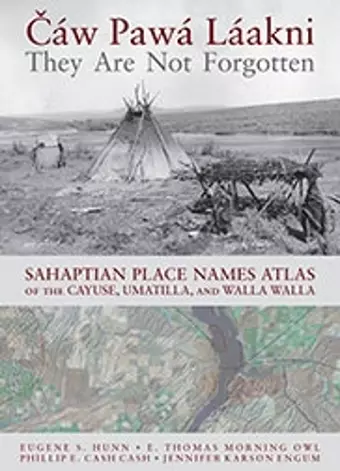Cáw Pawá Láakni / They Are Not Forgotten
Sahaptian Place Names Atlas of the Cayuse, Umatilla, and Walla Walla
Eugene S Hunn author E Thomas Morning Owl author Phillip E Cash Cash author Jennifer Karson Engum author
Format:Paperback
Publisher:University of Washington Press
Published:1st Dec '14
Currently unavailable, and unfortunately no date known when it will be back

Caw Pawa Laakni is an innovative work of collaborative scholarship that makes a bold statement of sovereignty over the tribes' culture, history, and territory. By recovering and preserving the traditional names and uses of significant aboriginal sites, the atlas declares that modern Indian nations intend to remain stewards of their natural and human heritage. -- Andrew H. Fisher, author of Shadow Tribe: The Making of Columbia River Indian Identity
Draws from the knowledge of Native and non-Native elders and scholars to present an account of interactions between a homeland and its people. This title also presents descriptions of 400 place names. It paints a picture of a way of life that provides context for interpreting pre-contact communities.
Cáw Pawá Láakni / They Are Not Forgotten is a book like none other. This ethnogeographic atlas of Native place names presents a compelling account of interactions between a homeland and its people. A project of the Tamástslikt Cultural Institute at the Confederated Tribes of the Umatilla Indian Reservation - composed of the Cayuse, Umatilla, and Walla Walla Tribes in eastern Oregon - Cáw Pawá Láakni documents and describes more than four hundred place names. The full-color, detailed maps and the narrative that introduces and supports them paint a picture of a way of life. This meticulous assemblage of memory and meaning echoes cultural and geographical information that has all but disappeared from common knowledge.
To create this historical and cultural atlas of the Cayuse, Umatilla, and Walla Walla homeland, which spans the Columbia River and its tributaries from southeastern Washington to northeastern Oregon, ethnographic, traditional, and institutional knowledge was gathered together and incorporated into a GIS database to produce customized maps that present this knowledge. Many of the accounts are from the individuals who traveled on horseback, lived in and saw these places, and possessed knowledge that can no longer be replicated. In presenting these place-names, the Tribes strive to ensure the vitality of this communal knowledge into the future.
In Cáw Pawá Láakni, places named in Indian languages are juxtaposed with sites that are central to the colonial period in the West, such as those described by the Lewis and Clark Expedition and those given to fur-trading posts, missions, and places on the Oregon Trail. The atlas adds a needed and vivid Native perspective to the written history and geography of Oregon and the West.
ISBN: 9780295990262
Dimensions: unknown
Weight: 953g
272 pages